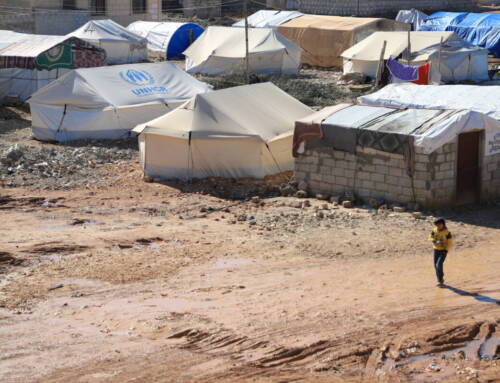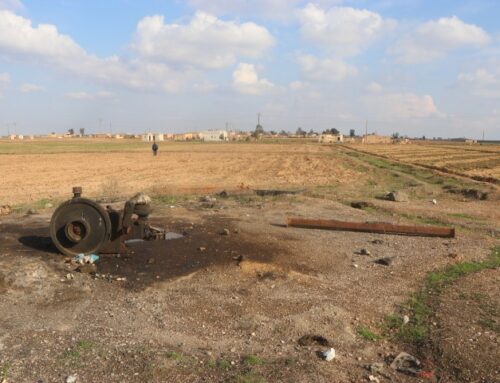‘Everything coming into Eastern Ghouta is by smuggling’
April 2, 2014 On February 22, United Nations Security Council […]
2 April 2014
April 2, 2014
On February 22, United Nations Security Council Resolution 2139 demanded that all parties, “in particular the Syrian authorities” open corridors for humanitarian aid across conflict lines. More than a month later, little has changed.
In several Damascus suburbs, rebels have acquiesced to an intermittent series of civilian-negotiated ceasefires to allow the entry of humanitarian aid and the opening of evacuation corridors, confronted with a choice of either negotiating with the regime or watching civilians starve.
Syria Direct’s Raneem Qubatros spoke with three humanitarian aid workers in regime- and rebel-held Damascus who speak candidly about the challenges of delivering food and medical aid amidst shifting conflict lines and government harassment.

Fajer a-Shami is an emergency aid activist in the villages around Damascus.
Q: Have UN convoys reached damaged villages?
As far as I know, approximately 100 food baskets have been sent to families in Douma, which has under siege for months. These 100 baskets are not at all helpful. [Syria’s permanent representative to the UN Bashar] al-Jaafari always releases reports saying they are in favor of providing aid, but as soon as it reaches Homs, Aleppo, the villages around Damascus or wherever else, all of a sudden there are clashes and every one gets scared and runs away, leaving the aid packages in regime territory.
Tha’er, a doctor in a field hospital in the Damascus suburbs.
Q: Have UN convoys reached the harest-hit towns outside Damascus?
Yesterday, a woman smuggled in an anti-inflammatory injection in a loaf of bread through one of the checkpoints. So, obviously, no, we have not received any medical supplies from any official source.
The only reason that they [regime forces] have slightly loosened control over the checkpoints is because the fruit season has begun in Ghouta and they want to open up the road to take as much as they can. Here, people are starving and just need some money.
Q: How do you get medicines?
Smuggling. Everything coming into Eastern Ghouta comes by way of smuggling. If any medicine comes with a medical team, they face harsh punishment from the regime.
Q: Can you speak in more detail about the current medical situation?
For example, in all of Eastern Ghouta there is not a single woman doctor! There is very little specialization and we have tried to create medicines here with very elementary methods since there is no factory, no electricity and no fuel. There are five x-ray centers. There are a lot of veterinarians that are working as doctors now and have begun helping in ambulances.
As for male doctors, there are approximately 60 doctors, of whom 5 are experienced surgeons, one urologist and a small number of dentists. Nearly 50 percent of these doctors never graduated since in the last years of their studies there was a high demand for doctors by the regime and they were forced to leave their studies and treat the injured in Ghouta.
Glenar, based out of Damascus, is a volunteer with the Red Crescent in the region that is considered to be under regime control.
Q: A-Salahia and Rukn a-Deen, where you live, are under government control. Can you speak about food and medical distribution in the region and their costs?
In terms of Rukn al-Deen, food is available but very expensive compared to what they were before. [Today], a loaf of bread hovers around 200 to 250 lira whereas before it was 25 lira. At times, prices rise depending on conditions on the ground, or if there was shelling. In terms of medical supplies, there are some medicines that are simply unavailable in certain regions, such as medicines for diabetes, blood pressure and epilepsy.
Q: In your work as a Red Crescent volunteer, have you aid from the United Nations?
Every so often, aid workers come and distribute food to families that we have in our records who are in desperate need for aid. Obviously, it is the Red Crescent, UNRWA and UNICEF that are in charge of these distributions.
Q: Are families that are in the Red Crescent’s records whether in regime- or rebel-controlled areas, subject to harassment?
They are being heavily harassed but by the security forces, not the Red Crescent. We don’t ever interfere, and even if we did, it wouldn’t lead to anything.
Now, if any family wants to register with the Red Crescent they must have a security card from the police station. They have to go to the local police station and inform them that they are [registering] and provide them with a rent contract, even if they are living with family or relatives. The police then give them a stamped piece of paper.
Anyone who is stopped at one the many checkpoints in Damascus and is found to be from an afflicted area without a security card is dragged to the police station, where he would either be forced to get one of these cards or be arrested.
Q: I also understand that you help families not registered with the Red Crescent. Can you speak about why those families in particular are not registered?
We work like any other small and simple NGO that can help only 150 displaced families in areas controlled by the regime. There are families that cannot register with the Red Crescent or any other organization because they have a family member under arrest, so they fear the rest of the family will be arrested as well. Or, they have a family member who was martyred under torture in prison, or one who fought and was martyred with the Free Syrian Army. They cannot register, or even speak about the matter.
For more from Syria Direct, like us on Facebook or follow us on Twitter.






